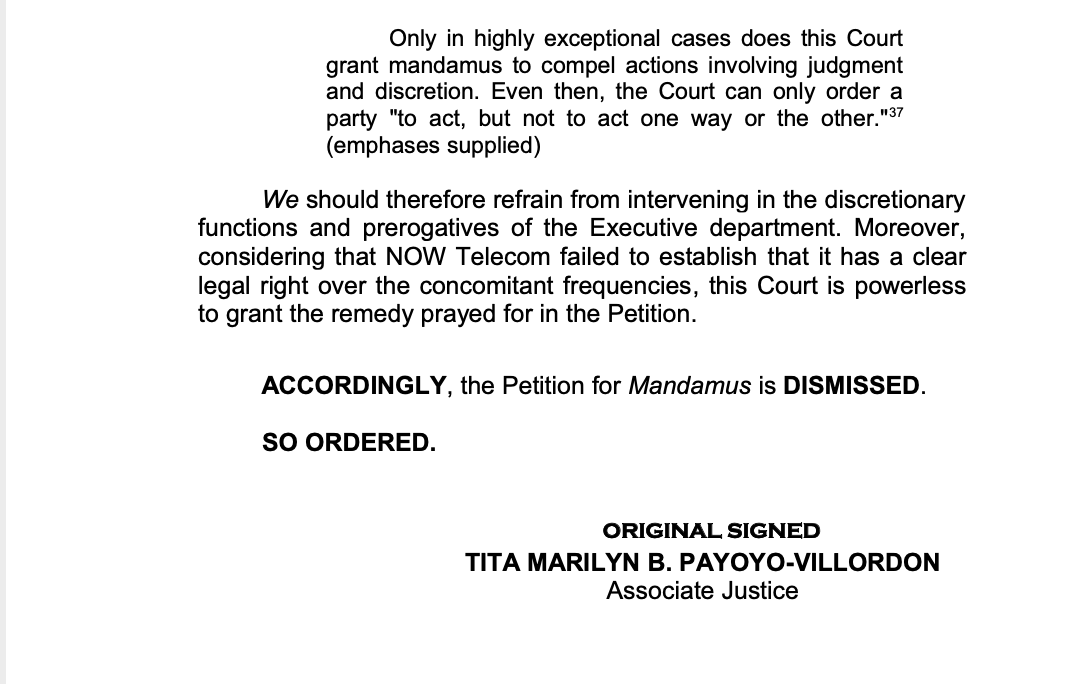News
CA junks telco firm’s suit vs. NTC over frequency claim

FILE: Court of Appeals of the Philippines in Maria Orosa Street, Ermita in Manila. (Photo By Ramon FVelasquez – Own work, CC BY-SA 3.0)
MANILA – The Court of Appeals (CA) has turned down the suit by a telecommunications firm against the National Telecommunications Commission (NTC) in connection with its application for a provisional authority to operate a cellular mobile telephone service within specific frequency ranges.
In a 16-page decision dated Sept.
28, the CA’s Special Ninth Division ruled that NOW Telecom Co. Inc. had not shown a clear legal right to the frequencies it sought and that the NTC had not neglected its duty on the case.
“We should therefore refrain from intervening in the discretionary functions and prerogatives of the Executive department. Moreover, considering that NOW Telecom failed to establish that it has a clear legal right over the concomitant frequencies, this Court is powerless to grant the remedy prayed for in the petition,” the tribunal said.
The case involved the firm’s request to compel the NTC to comply with the resolution and order of automatic approval (OAA) issued by the Anti-Red Tape Authority (ARTA).
NOW Telecom had filed a petition for mandamus under Rule 65 of the Revised Rules of Court, seeking to compel the NTC and its then Commissioner Gamaliel Cordoba to adhere to ARTA’s resolution and OAA both dated March 1, 2021.

The ARTA declared that the “firms application for a provisional authority to operate in the frequency range 1970 Mhz – 1980 Mhz paired with 2160 Mhz to 2170 Mhz and 3.6 Ghz to 3.8 Ghz frequency ranges”, was automatically approved by operation of law, specifically Republic Act 11032, otherwise known as the Ease of Doing Business and Efficient Government Service Delivery Act of 2018.
In a resolution dated June 17, 2022, ARTA reversed its previous decisions and formally recommended NOW Telecom’s application for frequency assignment to the NTC.
The CA said the firm’s petition based its claim to specific frequency ranges and its claim that the NTC unjustly neglected its duty to assign them.
However, it said NOW Telecom failed to demonstrate a clear legal right over the frequencies left unassigned by the NTC.
The CA noted that ARTA’s June 17, 2022 resolution was not yet final, with an ongoing appeal before the Office of the President, indicating an unresolved dispute over NOW Telecom’s entitlement to these frequencies.
NOW Telecom argued that assigning the frequencies was a ministerial duty for the NTC, compelling mandamus.
Mandamus is a judicial remedy in the form of an order from a court to any government, subordinate court, corporation, or public authority, to do (or forbear from doing) some specific act which that body is obliged under law to do (or refrain from doing), and which is in the nature of public duty, and in certain cases one of a statutory duty.
However, the CA disagreed, citing the National Telecommunications Act (RA 7925), which granted the NTC discretion in implementing the law’s policies and objectives.
Given the NTC’s prior disqualification of NOW Telecom due to non-compliance with legal requirements, the CA ruled that ordering immediate assignment of frequencies would infringe upon the NTC’s lawful discretion.
The CA upheld the principle that mandamus does not apply when public officers are required to exercise judgment in performing their duties.
As early as 2005, the NTC found NOW Telecom to be non-compliant and was disqualified from the assignment of 3G frequency bands due to unpaid supervision and regulation fees (SRF) and spectrum user fees (SUF) amounting to PHP2.6 billion.
In January 2006, NOW Telecom was issued a provisional authority (PA) that was not specific to 3G and was premised on the condition on the payment of its outstanding SRF and SUF obligations.
At that time, the issue on the outstanding SRF and SUF was already pending with the Supreme Court.
In 2017, the firm was assigned the 20MHz contiguous bandwidth, 3520 to 3540 MHz, under the 3.5 GHz on the same condition that it settle its outstanding SUF and SRF.
NOW Telecom’s PA was extended for 36 months until September 2020 subject again to the conditions regarding the SUF and SRF, but this was never fulfilled by the company.





















